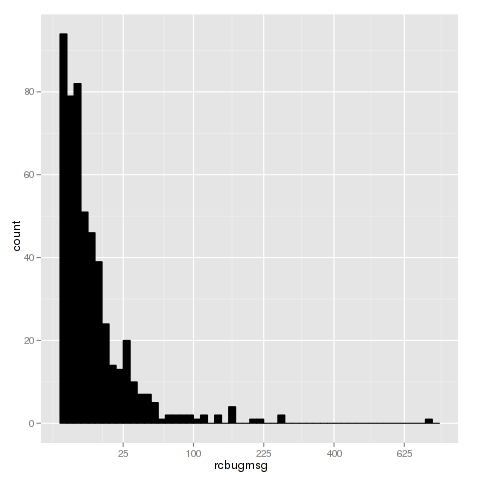Don t you love it when it looks simple and then it is actually simple, but you are not up to the task?
I am loving the
xlibs-dev transition, really, I mean it! Two of my packages,
fkiss and
xdigger got bit by this issue, and I immediately fixed the bugs with a little help from a
script provided by Moritz Muehlenhoff. really cool.
So I follow instructions in
The Debian Wiki, run the script, check with
pbuilder, upload and profit! Fun! End of world hunger! Err, almost. So I get all excited and decide to look at the
bugs. And I find a nice one:
#346347. Not bad,
gpsim FTBFS, Luk also took a look at it and didn t really like what he saw, it neede no
xlibs-dev or substitute for them and sitll FTBFS.
But wait! Just by looking at
gpsim s bugs page, I find out that there s a New Upstream Version(tm) (
#248931) available since 1 year and 241 day ago. Also, NMUs that have not been acknowledged for as long as almost two years... Not nice. And there s even a patch (
#345215) for building it on,
GNU/kFreeBSD... how sexy!
So I get all obsessive about it. But newer upstream needs a newer
libgtkextra-dev version (
#347397), which of course was not packaged (don't we all love Murphy?) and that s where I am stuck at. I loathe libraries. But still I gave it a try. And failed. Several times.
Fun? Yes! Profit? Nope! Do you want to take a look at it? Easy.
It s all here.
Amaya also
FTBFS. And I want to NMU
amaya. Badly. Since I first heard about
amaya, and realized that I am named after a web browser (sucky as it might be) and after getting many IRC highlights (every time that
amaya FTBFS is mentioned on IRC), I have been wanting to use/adopt/NMU it. Amaya NMUs
amaya, how recursive can it get?
I will go to bed now, and try not to keep thinking about it, not because I want to become an early riser,
Gunnar, no need to worry! But reading about it I thought it would be healthier for me to wake up everyday at the same hour, so that s all I am aiming for. If you know me, you might be rolling on the floor laughing as you read this. So am I! But, if you know me, keep in mind that I have been drinking coffee with no sugar since August... Hey! You are not laughing anymore?
Vi and Emacs are doing fine. Emacs was not pregnant after all, or so the vet told me. It was hard to see her slowly become herself after surgery. Vi was perfectly OK all along, but she looked terrible. Anyway, she felt better by 6am the next day and came to bed, perfectly groomed, and purring like nothing had happened. A week has passed and she has started doing the gory part today... she s biting away the scar tissue, and it bleeds a bit. Oh my Spaghetti Monster!
 What happened in the reproducible
builds effort this week:
Media coverage
Motherboard published an article on the project inspired by the talk at the Chaos Communication 15. Journalists sadly rarely pick their headlines. The sensationalist How Debian Is Trying to Shut Down the CIA got started a few rants here and there. One from OpenBSD developper Ted Unangst lead to a good email contact and some thorough comments.
Toolchain fixes
What happened in the reproducible
builds effort this week:
Media coverage
Motherboard published an article on the project inspired by the talk at the Chaos Communication 15. Journalists sadly rarely pick their headlines. The sensationalist How Debian Is Trying to Shut Down the CIA got started a few rants here and there. One from OpenBSD developper Ted Unangst lead to a good email contact and some thorough comments.
Toolchain fixes
 As the first and third quantile are close together we can assume that the majority of the work is done by a few, especially since the second quantile is 5. This is supported by the histogram below, where the x axis is the number of recorded messages and y is the number of developers.
As the first and third quantile are close together we can assume that the majority of the work is done by a few, especially since the second quantile is 5. This is supported by the histogram below, where the x axis is the number of recorded messages and y is the number of developers.

 Now that Squeeze is frozen, and release date is approaching, removing unused and buggy packages from the archive is a nice task to save maintenance burden which often involves several people (QA guys and Release Managers, mostly).
A lot of removal bugs are coming to
Now that Squeeze is frozen, and release date is approaching, removing unused and buggy packages from the archive is a nice task to save maintenance burden which often involves several people (QA guys and Release Managers, mostly).
A lot of removal bugs are coming to  As you have probably already seen, I started again to publish the
As you have probably already seen, I started again to publish the
 Just uploaded tomoyo-tools and is waiting in the NEW queue.Thanks to Moritz Muehlenhoff, tomoyo kernel support should be available in Debian with kernel 2.6.32-13 and above.
Just uploaded tomoyo-tools and is waiting in the NEW queue.Thanks to Moritz Muehlenhoff, tomoyo kernel support should be available in Debian with kernel 2.6.32-13 and above. Following my last blog post, Moritz Muehlenhoff sent me another
statistical list in a desperate attempt to prove that there is no
german cabal.
As usual, when counting antyhing per inhabitant in IT, Finland wins:
Following my last blog post, Moritz Muehlenhoff sent me another
statistical list in a desperate attempt to prove that there is no
german cabal.
As usual, when counting antyhing per inhabitant in IT, Finland wins:
 Another point release for Etch has been done; now it's the time for the CD
team to roll out new images after the next mirror pulse. The official
announcements (prepared by Alexander Reichle-Schmehl, thanks!) will follow
shortly afterwards. FTP master of the day was Joerg Jaspert, who
did his first point release since Woody, as he told us on IRC. We
appreciate your work and you spending your time that shortly before
going to Argentina.
This point release includes the etchnhalf update introducing a new kernel
image (based on 2.6.24) and some driver updates. Additionally the
infamous openssl hole will be fixed for good, even for new installs.
Again I want to present you a list of people who contributed to this
release. It cannot be complete as I got the information out of the
Another point release for Etch has been done; now it's the time for the CD
team to roll out new images after the next mirror pulse. The official
announcements (prepared by Alexander Reichle-Schmehl, thanks!) will follow
shortly afterwards. FTP master of the day was Joerg Jaspert, who
did his first point release since Woody, as he told us on IRC. We
appreciate your work and you spending your time that shortly before
going to Argentina.
This point release includes the etchnhalf update introducing a new kernel
image (based on 2.6.24) and some driver updates. Additionally the
infamous openssl hole will be fixed for good, even for new installs.
Again I want to present you a list of people who contributed to this
release. It cannot be complete as I got the information out of the